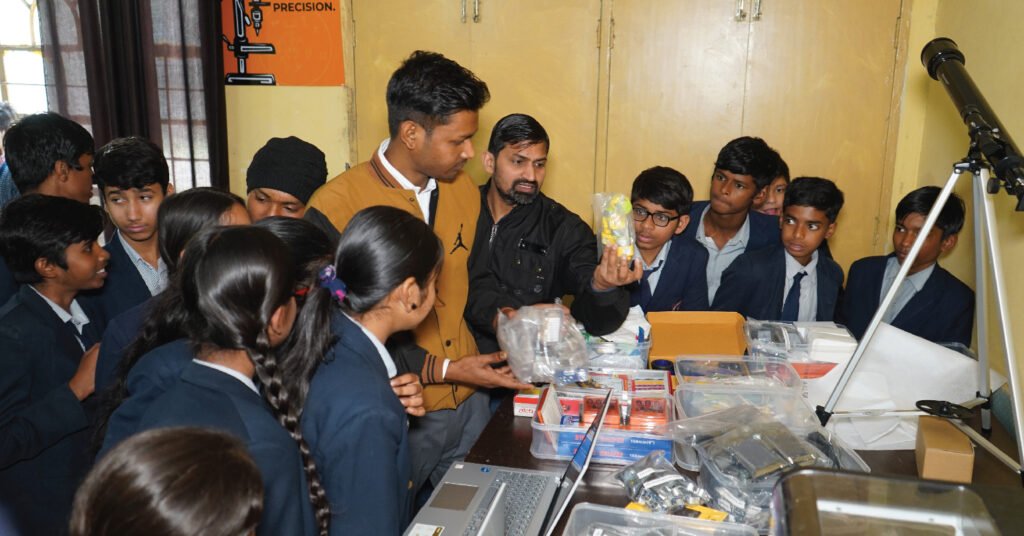Science, technology, engineering, and mathematics, or STEM subjects, are growing more and more significant in today’s society. They address the urgent need to fill skilled labor positions in fields critical to technological advancement. Students who acquire a STEM education are better equipped to handle difficult situations, stay current with technology, and contribute significantly to society. With technology advancing at a rapid pace, STEM education is essential for developing children’s critical thinking skills and motivating them to take on real-world difficulties. It also fosters adaptability, creativity, and teamwork—all necessary qualities in today’s globally interconnected and competitive job market.
STEM education benefits the entire nation in a number of ways. It develops critical thinking, creativity, and problem-solving skills at a young age, laying the foundation for future careers. By engaging in STEM education, kids may explore science, technology, engineering, and math in an interactive manner that sparks their interest and encourages exploration. Youngsters who experience this become more resilient and adaptable, better preparing them for a workforce that is always changing. Teachers are crucial in developing these skills to guarantee that students succeed in STEM courses.
The Importance of STEM Education
There are several advantages to teaching STEM to kids, which might help the country as a whole. Early development of critical thinking, creativity, and problem-solving abilities is beneficial. The groundwork for upcoming academic and professional aspirations is laid by this crucial learning experience. Second, students may learn about the wonders of science, technology, engineering, and math in an interactive and captivating way by participating in STEM education.
This kindles interest pushes for exploration, and makes discoveries easier, all of which deepen our comprehension of how the world works. Youngsters who take STEM classes become more robust and adaptive adults, better preparing them for a career that is always changing due to technological breakthroughs. Teachers are essential in helping kids develop and grow their STEM abilities and making sure they are proficient in these important areas.
21st-Century Knowledge and Hands-on-Learning
Children’s curiosity and excitement for learning are fostered by STEM education through practical exercises, experiments, and interactive learning. Their early experiences develop a lifelong love of learning in them. It also fosters inclusion and accessibility while ensuring that everyone can engage, regardless of gender, location, or socioeconomic status, all of which are crucial 21st-century skills. When resources, scholarships, and mentoring programs are made accessible, underrepresented groups are more likely to engage in STEM education. By encouraging creativity and research and placing a strong emphasis on hands-on learning, critical thinking, and creative thinking, STEM programs help to create a culture of innovation.
Making practical experience a priority enables students to have access to state-of-the-art tools, technology, and resources for in-depth learning. Tasks and initiatives involving problem-solving stimulate original thought and lead to game-changing discoveries. Critical thinking, which helps students assess the evidence, refute assumptions, and draw well-reasoned conclusions, is another area of concentration. Assigning students to experienced mentors who can convey information, provide guidance, and provide perceptive feedback is one of the key components. These creatively stimulating mentorship programs assist aspiring researchers and inventors.
Roles of Ethics in STEM
For scientific and technical developments to help society without harming it, ethics in STEM fields are essential. It comprises guiding principles that guarantee honesty, openness, and responsibility in the behavior of experts in different disciplines. In addition to promoting environmental sustainability and safeguarding public health and safety, ethical concerns also aid in preventing technology exploitation.
Neglecting ethics has historically had serious negative effects on society and the environment. Therefore, it is crucial to include ethical principles in STEM education and practice in order to promote responsible innovation, increase public trust, and fairly and successfully handle complex global concerns.
Innovative Practices and Ethical Challenges
Artificial intelligence, biotechnology, and renewable energy are examples of innovative STEM practices that propel advancement and address urgent global concerns. These developments do, however, provide serious ethical difficulties. Concerns regarding employment displacement, prejudice, and privacy are brought up by AI. Discussions about consent, safety, and environmental effects are sparked by biotechnology, which includes genetic engineering. Ecological protection and efficiency must be balanced in renewable energy programs.
A multidisciplinary strategy is needed to address these ethical issues, integrating stakeholders from many sectors to make sure that innovation complies with the law, social values, and environmental sustainability. To ensure that new technologies are developed and implemented responsibly, strong ethical frameworks are necessary.
Balancing Innovation and Responsibility
Integrating ethical issues into the research and development process is necessary to strike a balance between accountability and innovation in STEM fields. This entails placing equal weight behind technological breakthroughs and societal effects, responsibility, and openness. Enforcing strict ethical standards and regulatory monitoring guarantees that advances don’t jeopardize environmental sustainability, privacy, or public safety.
To establish a sense of responsibility, STEM workers must get ethics education and training. Technology advancement and societal values are more in line when scientists, ethicists, legislators, and the general public work together. STEM professions may accomplish sustainable and inclusive improvements that benefit both people and the environment by promoting an ethically conscious culture.
To sum up, Ethics are essential in STEM domains if responsible innovation is to benefit society without endangering it. Professionals act with transparency, accountability, and sustainability in mind, driven by moral considerations. Advanced techniques in biotechnology, AI, and renewable energy promote advancements but also present significant moral dilemmas. Strong ethical frameworks and multidisciplinary collaboration are required to solve them and bring technological advancements in accordance with societal norms and regulatory obligations. Integrating ethics into STEM education fosters a sense of responsibility and better prepare future leaders to tackle complex global concerns. STEM fields may achieve sustainable growth by balancing innovation and responsibility, which enhances human and environmental well-being.




